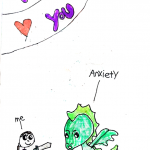Introducing our Kids Anxiety Group

As parents we sometimes wonder if our child’s thoughts, feelings (worries) and behaviors are typical for their age. We wonder if other children experience similar worries or “jitters”, and we ask ourselves if it is time to seek assistance for our little ones.
Questions you may want to ask yourself when you are thinking of seeking help for your child’s anxiety:
- Are worries getting in the way of your child’s day to day activities or ability to function in settings such as school?
- Do worries affect your relationship with your child or other people in your family? Do you feel you “avoid” certain activities, situations, or topics?
- Does it interfere with your child making or maintaining friendships, or trying new things?
- Does your child express concern about their level of worry or “symptoms” such as stomach or headaches?
- Does what your child express seem typical of what you might expect from other children their age?
- Does it seem their worries have grown over time? How often does your child seem to experience their worries or avoid situations?
What is the best treatment for childhood anxiety?
If you decide you want to seek treatment for your child’s worry/anxiety you will find that one of the best evidence-based treatments is Cognitive Behavioral Therapy (CBT). CBT is based on the idea that how we think (cognitive), how we feel (emotion) and how we act (behavioral) are all connected and affect one another. It is important to consider what happens for a child when they are experiencing anxiety. Typically, they begin to avoid, and learn that through avoidance they “feel” better. As avoidance grows, so does the fear which can be very strong, powerful, and scary. The skills learned in CBT can help kids and parents learn how to affectively manage their fears. In CBT treatment there is a component of exposure. With support of their parents or caregivers’ kids are exposed to their fears (triggers) safely, through stages. As they get used to each trigger their anxiety fades and they progress to addressing more “feared” situations.
As you explore treatment options for your child you will find both individual and group treatment. We wanted to list some of the benefits of group programming here for you to consider.
Benefits of group programming
- Build skills for self confidence in a safe setting
- Equip children with tools
- Children feel heard and supported by other group members and their families
- Assists in normalizing children’s feelings and responses
- Allows for learning from peers to occur
Coping Cat CBT Group at Dragonfly
We invite you to attend our Coping Cat group at Dragonfly Child and Family Wellness Centre. Coping Cat is an evidence-based CBT program for children ages 6-12 and their parents/caregivers. During the 8-week group parents and children will learn to better understand and recognize emotional and physical reactions to anxiety. They will develop coping and problem-solving skills. Children will have opportunities to develop clarifying thoughts and feelings in situations which cause them anxiety. Participants will work on “exposure” exercises, they will challenge their fears as they address situations which cause problems for them day to day.


